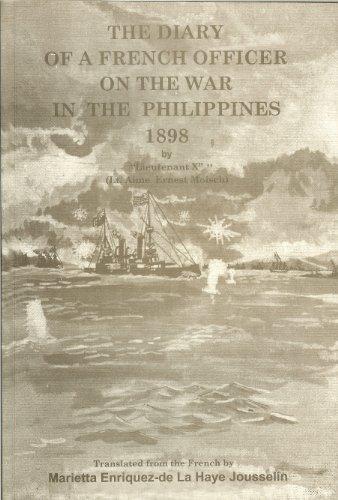Admiral Dewey and Aguinaldo are both trying to outsmart each other. In the past, Dewey needed Aguinaldo. Now it is Aguinaldo who needs Dewey. This reversal in position came out progressively without verbal or written commitments. Aguinaldo is constrained into showing loyalty, while the Yankees take advantage of their position.
Whether it is in his interest or not, Aguinaldo wants freedom for his country. He now fears the weight of the hand which has helped him deliver his fatherland. Unable to rid himself of the Americans, he attempts to associate with them as little as possible. Yet he hopes that they will recognize the government he has established. He has invested himself with dictatorial powers and has declared a republic.
At first, Admiral Dewey did not publicly associate himself with this new government, but neither did he oppose it. Aguinaldo for his part, hides the fact that he views the Americans with a great deal of contempt in order to avoid a break in his relationship with the United States should they attempt to provoke such a situation. His main concern is to show himself worthy of governing, and his nation worthy of independence. This very shrewd strategy is already gaining favor among the more liberal-minded.
Indeed, this chief of monkeys (as the Spaniards dared to describe the Filipinos) is maintaining order and respecting all the rules of war. He is seeking the confidence of Europe and has the right to claim it on the basis of his actions. He takes pride in the impeccable courtesies he bestows on the foreigners, even allowing them to visit provinces occupied by insurrectionists. Vis-a-vis the family of the governor-general, for example, he was quite liberal in granting them safe conduct to reenter Manila. Reports show that order reigns in most areas in spite of the war and that a high level of discipline is observed. Some excesses, naturally, have been committed, but which war has ever been exempt from them? In any event, there have been no massacres or shedding of blood. Retaliations have been limited to certain forms of vengeance directed mainly towards the monks. Aguinaldo is even thinking of uniting all the indigenous tribes that are not fighting among themselves. A certain method is evident in this revolution. Their troops are not very different from the regular troops, and they have handled their arms rather well. Neither does the discipline of the Tagals suffer by comparison with the mediocre standards of the Americans.
While General Aguinaldo was busy trying to establish the image of a normal state, Admiral Dewey seemed determined to make him fail. On more than one occasion, he tried to provoke either Aguinaldo or his soldiers to commit some act of violence. But after this, Admiral Dewey, deciding to recognize this half-bred who proclaimed himself chief of the insurgents’ fleet following the murder of the crew of Filipinas, received this rogue on board the Olympia. In addition, Admiral Dewey handed over to Aguinaldo and his troops a large number of Spanish prisoners captured in the environs of Manila and even in the Mariannes, Perhaps behind this strange behavior is some preconceived plan. He certainly was not sure that Aguinaldo had the necessary authority over the enraged insurgents now drunk with success.
Aguinaldo has successfully emerged from these ordeals. He has published several legislative acts on behalf of his government which express his concern for his people. In the name of the fatherland, his emissaries succeeded in fomenting a rebellion in the southern island, an unsatisfactory area during the Spanish domination, where the name of the United States was not even known. It is said that he will soon call upon his troops to take a solemn oath and convene a Philippine parliament.
In Manila, business has come to a standstill and there is hardly any sign of life. The real wealth of the country lies in the people themselves. They represent the work force, the land, the cultures, the enterprises all of which cannot be sustained without them. Like the Chinese and the Japanese, they alone can carry out the task. A Filipino rebellion is not simply a political movement; it has the capacity to stop life itself. That is why exploiting the Filipinos could be a grave error on the part of the Americans. If it is their intention to make the Philippines their private fiefdom, they will have to eliminate the Filipinos or reduce them to slaves.
Today, all the islands are in the hands of the insurgents, except for Manila, although they permeate the city and surroundings. All commercial activity has been cut off in the east, including Laguna. To the north, 40 kilometers of railroad tracks are also under their control.
